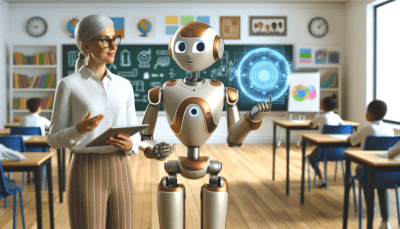

|
|
Editor’s Note: The following is the first in a series of three Perspectives from the Social Institute about artificial intelligence.
Did you know that artificial intelligence has impacted students’ experiences for decades? The term artificial intelligence (AI) was coined in the mid-20th century by computer scientist John McCarthy and since then, AI has evolved a lot. From Alan Turing’s proposal of The Imitation Game, which tests machine intelligence, to industries embracing AI for automation and process optimization to the everyday person using it on their personal devices.
Every day students experience AI every time they browse social media, game with friends, stream their favorite movies or shows on Netflix, or even shop on Amazon. While AI helps tailor student experiences to be personalized, it does so by relying heavily on capturing personal data, such as names, addresses, financial information, and even medical records. This reminds us of why it’s so important to empower students to protect their private information and be mindful of their screen time.
Artificial intelligence might seem like it just recently took over our lives, but is that really the case?
From the moment students wake up, AI is everywhere
“The theory and development of computer systems able to perform tasks that normally require human intelligence, such as visual perception, speech recognition, decision-making, and translation between languages.”
The Oxford Dictionary
With this in mind, it might not surprise you to learn that nearly from the moment students wake up, they are using artificial intelligence.
According to Common Sense Research, 43% of tweens (age 8-12) and 95% of teens (age 13-18) have and use their own smartphone. As many students use their phones as alarm clocks, these devices are often the first thing they pick up in the morning. When they unlock their phones to turn off the alarm or scroll through TikTok or Instagram, it’s artificial intelligence that powers the facial recognition on their devices. So within the first few seconds of waking up, students are experiencing AI.
Now let’s talk about TikTok and Instagram. Perhaps before rolling out of bed to get ready for school, students will scroll, like posts, comment on videos, and follow accounts. Artificial intelligence captures all of this behavior to tailor what a student continues to see in their social media feeds. AI observes students’ behavior and makes decisions on what to show them next to keep their attention for as long as possible or send notifications to bring them back.
When they get to school, ChatGPT seems to dominate conversations. Schools wonder if they should allow ChatGPT or ban it, like some school systems tried to do in early 2023. Teachers — who might use it to help with lesson planning — wonder if they should allow students to use it for some (definitely not all) schoolwork. And underlying all of this is the ever-present question in teachers’ minds: “Did my students write this paper or did they use ChatGPT?”
While this is a valid concern, ChatGPT, one of the most obvious versions of artificial intelligence, can help encourage critical thinking by providing insightful questions on a certain topic. According to Kathy Hirsh-Paesk, a professor of psychology at Temple University in Philadelphia, “ChatGPT teaches students to ask better questions and then defend those questions, which could help them become real scientists.”
So what is the solution to empowering students to navigate a world that is becoming filled with artificial intelligence in everyday life?
High standards for navigating AI in positive ways
Artificial intelligence is not inherently bad or good. It has its benefits, like the ease of facial recognition or asking Alexa what the weather is like. And when navigating social media, AI’s ability to suggest content that we might find interesting helps us explore new interests we may not have known about before. But, it’s also essential to navigate artificial intelligence in positive ways.
Because of the addictive nature of the relationship between AI and social media, empowering students with modern life skills that help them to live up to high standards as they navigate social media and tech has never been more important. One such standard that equips students against addictive algorithms is striking a balance. This means empowering students with the skills and tools to balance the time they spend on social media with their daily responsibilities, school work, and time spent in person with friends and family.
These life skills don’t just empower students as they navigate their favorite apps like TikTok or Snapchat. You can also equip students to make high-character decisions in their approach to ChatGPT. Empower your students with these modern life skills, so that when faced with ChatGPT, they navigate it in ethical ways:
- Critical Thinking: Make sure your students don’t believe everything ChatGPT says right away. Even though it’s smart, it can sometimes be wrong. It’s a good habit to check the information with reliable sources to be sure it’s true.
- Responsible Decision-Making: AI tools, like ChatGPT, can be super helpful for studying and having fun with friends. But it’s important to remind students not to use AI in a way that could be mean to others or in unethical ways.
- Self-Awareness: Remind your students that AI, like ChatGPT, might have some biases because of the opinions of the people who made it. This means they should be careful about how they ask questions, so they don’t get answers that are biased or unfair.
- Using Tech for Good: Encourage your students to use ChatGPT for good things! They can use it to help with homework, improve their grammar, or even learn new words. There are lots of cool and positive ways for them to use AI to make their learning even better.
In The Social Institute’s collaborative learning platform, #WinAtSocial, more than 2,000 highschoolers huddled up on the role of artificial intelligence in their lives and shared that nearly 50% of them would like their schools to “allow ChatGPT and teach them how to use it well.”
From sun up to sun down, artificial intelligence is in students’ lives, and it’s not going away. As educators, how will you meet students where they are and empower them to navigate this ever-evolving technology in positive ways? Contact us at The Social Institute to learn more about a positive approach to tech and social media.





